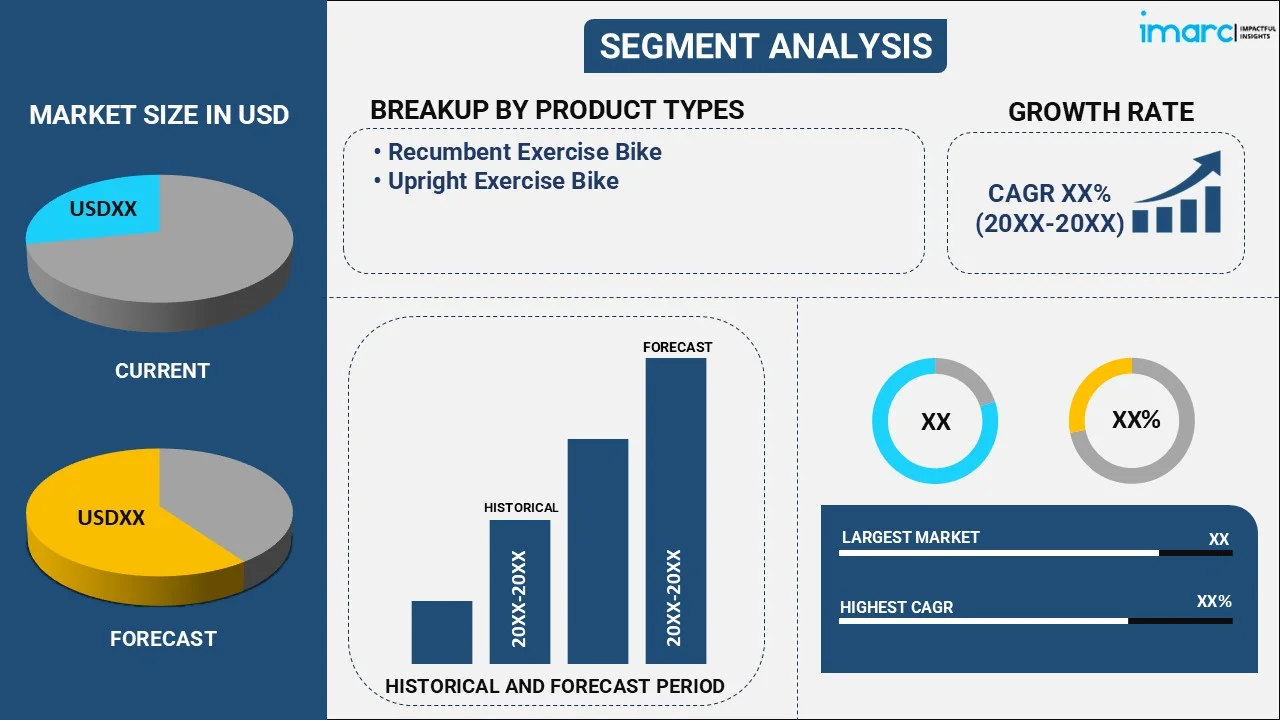
Exercise Bike Market Report by Product Type (Recumbent Exercise Bike, Upright Exercise Bike), End-User (Home Consumers, Gyms/Health Clubs, and Others), and Region 2025-2033
Market Overview:
The global exercise bike market size reached USD 728.0 Million in 2024. Looking forward, IMARC Group expects the market to reach USD 1,061.1 Million by 2033, exhibiting a growth rate (CAGR) of 4.3% during 2025-2033. The increasing awareness about the importance of a healthy lifestyle and regular exercise, escalating demand for home fitness equipment, and numerous technological advancements are some of the major factors propelling the market.
|
Report Attribute
|
Key Statistics
|
|---|---|
|
Base Year
|
2024 |
|
Forecast Years
|
2025-2033 |
|
Historical Years
|
2019-2024
|
|
Market Size in 2024
|
USD 728.0 Million |
|
Market Forecast in 2033
|
USD 1,061.1 Million |
| Market Growth Rate (2025-2033) | 4.3% |
An exercise bike, also known as a stationary bike or fitness cycle, is a specialized fitness equipment designed for cardiovascular exercise and indoor cycling. It consists of a stationary frame with a comfortable seat, handlebars, and pedals. Unlike traditional bicycles, exercise bikes remain stationary while the user pedals, making them an ideal choice for indoor workouts. Exercise bikes offer a low-impact, joint-friendly way to improve cardiovascular fitness, build leg strength, and burn calories. They come in various types, including upright bikes that mimic the posture of a regular bicycle, recumbent bikes with a more laid-back seating position, and indoor cycling bikes for high-intensity training.

The increasing awareness about the importance of a healthy lifestyle and regular physical activity that motivates individuals to invest in fitness equipment will stimulate the growth of the exercise bike market during the forecast period. Apart from this, the emerging global trend toward home fitness solutions, accelerated by the COVID-19 pandemic, has augmented the demand for exercise bikes as people seek safe and accessible ways to stay active. Moreover, numerous technological advancements that transformed the exercise bike landscape, with features such as interactive screens, virtual training programs, and connectivity options enhancing user engagement and motivation has catalyzed market growth. Additionally, the versatility and low-impact nature of exercise bikes that appeals to a wide range of users, including those with joint concerns or rehabilitation needs, is positively influencing market growth. Furthermore, the rise of remote work and busy lifestyles have escalated the demand for time-efficient fitness options, thereby contributing to market growth.
Exercise Bike Market Trends/Drivers:
Increasing health and wellness awareness
The growing awareness of health and wellness among the masses is a primary driver of the exercise bikes market as people become more conscious about the benefits of maintaining a healthy lifestyle, including reducing the risk of chronic diseases and improving overall well-being. Moreover, individuals are actively seeking ways to incorporate regular exercise into their daily routines. Exercise bikes offer a convenient and accessible means of achieving cardiovascular fitness and managing weight. Moreover, they cater to a broad spectrum of users, from beginners to advanced fitness enthusiasts, making them a versatile choice for individuals of all fitness levels. This awareness-driven demand for exercise bikes underscores their significance in promoting physical health and underscores their role as a key driver of market growth.
Emerging trend of home fitness
The shift toward home-based fitness solutions has become a prominent trend, which is fueling the market growth. Several factors contribute to this trend, including the COVID-19 pandemic, which emphasized the importance of home fitness due to lockdowns and safety concerns. Additionally, modern consumers value the privacy, convenience, and time-saving aspects of home workouts. Exercise bikes are particularly well-suited for home use because they are relatively compact, require minimal space, and can provide effective cardiovascular workouts. This trend reflects a fundamental change in how consumers approach fitness, with exercise bikes at the forefront of meeting the demand for accessible and convenient home-based exercise options. Their versatility and ability to cater to diverse fitness needs make them an indispensable part of the modern home gym.
Rapid technological advancements
The integration of advanced technology into exercise bikes is reshaping the market and driving consumer interest. Modern exercise bikes often come equipped with interactive screens, virtual training programs, and connectivity features. These innovations enhance user engagement by offering immersive and personalized workout experiences. Users can access guided workouts, track their progress, and even compete with others, all from the comfort of their homes. Such technological advancements cater to the evolving preferences of tech-savvy consumers and provide an added incentive for investing in exercise bikes. Moreover, these features make workouts more enjoyable and more effective, contributing to their heightened popularity and driving market growth as consumers seek equipment that aligns with their tech-enhanced lifestyles.
Exercise Bike Industry Segmentation:
IMARC Group provides an analysis of the key trends in each segment of the global exercise bike market report, along with forecasts at the global and regional levels from 2025-2033. Our report has categorized the market based on product type and end-user.
Breakup by Product Type:

- Recumbent Exercise Bike
- Upright Exercise Bike
Recumbent exercise bike represents the most popular product type
The report has provided a detailed breakup and analysis of the market based on the product type. This includes recumbent exercise bike and upright exercise bike. According to the report, recumbent exercise bike represented the largest segment.
A recumbent exercise bike is a type of stationary exercise bike designed with a reclined and ergonomic seating position, featuring a comfortable, chair-like seat with a backrest and pedals situated in front of the user. This unique design offers several advantages, driving the market expansion. Moreover, recumbent bikes provide superior comfort, making them an attractive choice for users of all fitness levels, including those with back or joint issues. Apart from this, their relaxed seating position promotes longer and more comfortable workouts, enhancing user motivation and adherence.
Additionally, recumbent bikes are well-suited for individuals seeking low-impact workouts that minimize stress on joints while still delivering effective cardiovascular exercise. The ergonomic design and accessibility make them particularly popular among seniors and rehabilitation patients. As a result, recumbent exercise bikes cater to a broader demographic, expanding their appeal and contributing to market growth.
Breakup by End-User:
- Home Consumers
- Gyms/Health Clubs
- Others
Home consumers account for the majority of the market share
A detailed breakup and analysis of the market based on the end-user has also been provided in the report. This includes home consumers, gyms/health clubs, and others. According to the report, home consumers accounted for the largest market share.
Home consumers refer to individuals who purchase exercise bikes for personal use within their residences. They play a pivotal role in fostering the growth of the market for exercise bikes for several reasons. Moreover, the increasing trend of setting up home gyms, amplified by the COVID-19 pandemic, has augmented the demand for exercise bikes as a convenient and space-efficient fitness solution. Apart from this, home consumers seek exercise bikes that cater to their specific needs, including factors like space constraints and personal fitness goals, leading to a diverse range of product offerings.
Furthermore, the desire for privacy and the flexibility to work out on one's schedule make exercise bikes an ideal choice for home consumers. As a result, exercise bike manufacturers and retailers are actively developing and marketing models that align with these preferences, which, in turn, drives innovation and competition within the market.
Breakup by Region:

- North America
- Europe
- Asia Pacific
- Latin America
- Middle East and Africa
North America exhibits a clear dominance in the market
The market research report has also provided a comprehensive analysis of all the major regional markets, which include North America, Europe, Asia Pacific, Latin America, and the Middle East and Africa. According to the report, North America accounted for the largest market share.
North America held the biggest share in the market due to several key factors. The region is witnessing a growing emphasis on fitness and wellness, coupled with rising concerns about sedentary lifestyles, which has fueled the demand for home fitness equipment, such as exercise bikes. Additionally, the region's well-developed fitness industry infrastructure, including gyms and fitness centers, has embraced the incorporation of modern exercise bikes, augmenting their popularity among consumers. Moreover, technological advancements, such as the integration of interactive features and connectivity options in exercise bikes, cater to the tech-savvy North American market, further driving product sales. The COVID-19 pandemic has also accelerated the trend of home-based fitness, with exercise bikes being a convenient choice, thus contributing to the market growth. Besides this, North America's strong purchasing power and consumer awareness of health and fitness make it a leading regional market for exercise bike manufacturers, with innovative products and marketing strategies tailored to meet the region's fitness needs.
Competitive Landscape:
The market is experiencing steady growth as key players are continuously innovating to meet the evolving demands of fitness enthusiasts. They are focusing on the integration of immersive virtual reality (VR) and augmented reality (AR) experiences into exercise bikes. Moreover, several leading companies have introduced VR headsets or AR displays that transport users to virtual environments, making workouts more engaging and enjoyable. These innovations enable users to cycle through virtual landscapes, race against digital opponents, and access interactive training programs. Additionally, they have launched AI-powered smart exercise bikes that offer personalized coaching, adaptive resistance adjustments, and real-time performance tracking. These bikes leverage AI algorithms to create customized workout plans tailored to individual fitness goals. Furthermore, the incorporation of eco-friendly materials and sustainable manufacturing processes in exercise bike production aligns with the growing emphasis on environmental responsibility, reflecting a holistic approach to innovation in the exercise bike industry.
The market research report has provided a comprehensive analysis of the competitive landscape in the market. Detailed profiles of all major companies have also been provided. Some of the key players in the market include:
- Brunswick Corporation
- Icon Health & Fitness, Inc.
- Nautilus
- Precor
- Technogym
Recent Developments:
- In July 2021, Icon Health & Fitness, Inc., a prominent player in the digital fitness industry, acquired Sweat, a leading digital fitness app tailored for women, under its umbrella. This strategic move underscores iFIT's commitment to expanding its portfolio and catering to a diverse audience of fitness enthusiasts. This strategic acquisition positions the company as a key player in the women's fitness market, allowing the company to tap into the growing demand for personalized and inclusive fitness experiences. It also strengthens iFIT's global presence, as Sweat boasts a large and dedicated user base around the world.
- In June 2023, Precor, a renowned provider of commercial fitness solutions, announced partnership with Stages Cycling, a leading manufacturer of commercial indoor cycling equipment, power meters, and cycle computers. It aims to broaden the accessibility of Stages Cycling's products to a wider range of markets and customers across the globe. This strategic agreement between Precor and Stages Cycling underscores both companies' commitment to advancing the fitness industry by providing state-of-the-art equipment and technology. It signifies a collaborative effort to empower fitness enthusiasts, gym operators, and trainers with the tools they need to elevate their fitness experiences and achieve their desired results.
Exercise Bike Market Report Scope:
| Report Features | Details |
|---|---|
| Base Year of the Analysis | 2024 |
| Historical Period | 2019-2024 |
| Forecast Period | 2025-2033 |
| Units | Million USD |
| Scope of the Report | Exploration of Historical Trends and Market Outlook, Industry Catalysts and Challenges, Segment-Wise Historical and Predictive Market Assessment:
|
| Product Types Covered | Recumbent Exercise Bike, Upright Exercise Bike |
| End-Users Covered | Home Consumers, Gyms/Health Clubs, Others |
| Regions Covered | Asia Pacific, Europe, North America, Latin America, Middle East and Africa |
| Companies Covered | Brunswick Corporation, Icon Health & Fitness, Inc., Nautilus, Precor, Technogym, etc. |
| Customization Scope | 10% Free Customization |
| Post-Sale Analyst Support | 10-12 Weeks |
| Delivery Format | PDF and Excel through Email (We can also provide the editable version of the report in PPT/Word format on special request) |
Key Benefits for Stakeholders:
- IMARC’s industry report offers a comprehensive quantitative analysis of various market segments, historical and current market trends, market forecasts, and dynamics of the exercise bike market from 2019-2033.
- The research report provides the latest information on the market drivers, challenges, and opportunities in the global exercise bike market.
- The study maps the leading, as well as the fastest-growing, regional markets.
- Porter's five forces analysis assist stakeholders in assessing the impact of new entrants, competitive rivalry, supplier power, buyer power, and the threat of substitution. It helps stakeholders to analyze the level of competition within the exercise bike industry and its attractiveness.
- Competitive landscape allows stakeholders to understand their competitive environment and provides an insight into the current positions of key players in the market.
Key Questions Answered in This Report
The exercise bike market was valued at USD 728.0 Million in 2024.
We expect the global exercise bike market to exhibit a CAGR of 4.3% during 2025-2033.
The hectic lifestyles of the individuals, along with the introduction of advanced exercise bikes that utilize Artificial Intelligence (AI) and Machine Learning (ML) technologies to personalize user workouts based on performance and fitness goals, are primarily driving the global exercise bike market.
The sudden outbreak of the COVID-19 pandemic has led to the increasing demand for home fitness equipment, such as exercise bikes, owing to the temporary closure of gyms, health clubs, and exercise parks, during the lockdown scenario.
Based on the product type, the global exercise bike market has been bifurcated into recumbent exercise bike and upright exercise bike. Currently, recumbent exercise bike exhibits clear dominance in the market.
Based on the end-user, the global exercise bike market can be divided into home consumers, gym/health clubs, and others. Among these, home consumers hold the majority of the total market share.
On a regional level, the market has been classified into North America, Europe, Asia Pacific, Latin America, and Middle East and Africa, where North America currently dominates the global market.
Some of the major players in the global exercise bike market include Brunswick Corporation, Icon Health & Fitness, Inc., Nautilus, Precor, Technogym, etc.
Need more help?
- Speak to our experienced analysts for insights on the current market scenarios.
- Include additional segments and countries to customize the report as per your requirement.
- Gain an unparalleled competitive advantage in your domain by understanding how to utilize the report and positively impacting your operations and revenue.
- For further assistance, please connect with our analysts.
 Request Customization
Request Customization
 Speak to an Analyst
Speak to an Analyst
 Request Brochure
Request Brochure
 Inquire Before Buying
Inquire Before Buying




.webp)




.webp)












